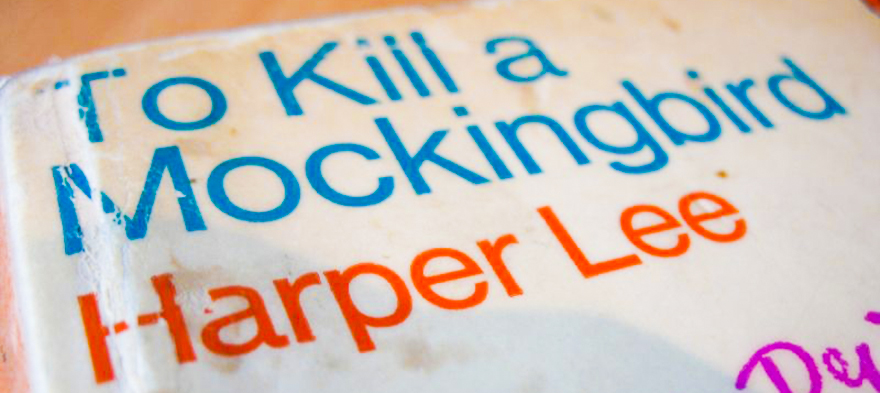
I’ll admit it. When I first heard of the Biloxi, Mississippi junior high school board’s decision to stop teaching “To Kill a Mockingbird,” my first instinct was to rage against the same racism that would bring the book to the forefront of the banned book list as it had at its publication. I wanted to shout all of the glorious reasons as to why the book is an American classic and should be taught in classrooms across our nation. But just like Harper Lee’s Pulitzer Prize-winning novel, the story was more complex. I first read about the incident in the New York Times. The story quoted Kenny Holloway, the vice president of the Biloxi School Board, who attributed the book’s removal from the eighth-grade curriculum to: “There is some language in the book that makes people uncomfortable, and we can teach the same lesson with other books.” A week later, the parent who filed the complaint with the school board came forward to speak at a school board meeting in justification.
It turns out that what bothered her more than the book itself, or other curriculum being taught at the school, was the students’ reactions to the uncomfortable language. According to the Biloxi Sun-Herald Yolanda Williams, who is African-American, found out that students were saying the N-word which is the word that often causes “Mockingbird” to get pulled from classrooms and school library shelves. After saying the N-word, the students were laughing. “Students were laughing out loud at the teacher’s response. That’s unacceptable to me. Is there not a better way to teach about that era and the horrors of that era, other than having kids laughing in class when the N-word is said?” The juxtaposition of responses caused me to go back to the novel for answers. Perhaps one of the novel’s most famous lines is uttered by the narrator’s father Atticus. “You never really know a man until you stand in his shoes and walk around in them.” My feelings towards “To Kill a Mockingbird” stem from my seventh-grade experience with it in my all-White classroom in small town Illinois. It was, what we call in the literary world, my mirror text. Centering on the childhood of a tomboy, her older brother, and her father who is a lawyer, I saw myself in Jean Louise Finch. My name, Gina Louise, is similar, I was also a tomboy with an older brother and a lawyer father. I fell in love with the book from page one. I imagine this being a stark contrast for Mrs. Williams and her daughter.
Putting myself in Mrs. Williams’ shoes as Atticus suggests is to imagine myself as an African-American mother, with a daughter who has come home from school to tell me that her classmates heard and said the N-word, a term of bigotry offensive to my race, a word I have heard many times, a word I didn’t want my daughter to grow up hearing. Worse yet, the response to the word was laughter instead of contempt or even ambivalence. From Mrs. Willliams’ perspective, I too, would be outraged, just not at the book.[/pullquote] Absent from this story are the student and teacher voices. Perhaps students weren’t prepared for dealing with the N-word in both a critical and empathetic manner. But one would think that Biloxi Junior High’s diverse student population (46 percent White, 36 percent African-American, and 10 percent Latino), would lend itself to critical reflections of both the subject matter and the time period. No, Mrs. Williams’ daughter shouldn’t be in a classroom where the N-word is used and laughter is the response. But is the book to blame? Or should the district instead be examining the racial dynamics happening in their junior high and how to deal with them? “Mockingbird” also offers us this gem of a line that I have standing up on my library desk. “real courage…It’s when you know you’re licked before you begin, but you begin anyway and see it through no matter what.” My advice to the students, the teacher, the school board, and other parents is to have the courage not to give up on reading “To Kill a Mockingbird .” My hope is that Mrs.Williams continues to have courage to speak up about the racial divisiveness she sees in her child’s school. But removing controversial texts may eliminate crucial conversations in the short-term instead of allowing these texts to be used as a tool to fight against racism which is one of “Mockingbird’s” best intentions.
Gina Caneva is a 14-year Chicago Public Schools veteran who works as a teacher-librarian and Writing Center Director at Lindblom Math and Science Academy. She is a National Board Certified teacher and Teach Plus Teaching Policy Fellowship alum. She has her M.Ed in Literacy, Language, and Culture from the University of Illinois at Chicago and writes extensively on education topics.
The fight for educational equity has never been just about schools. The real North Star for this work is providing opportunities for each child to thrive into adulthood. This means that our advocacy...
Your donation will support the work we do at brightbeam to shine a light on the voices who challenge decision makers to provide the learning opportunities all children need to thrive.
Ed Post is the flagship website platform of brightbeam, a 501(c3) network of education activists and influencers demanding a better education and a brighter future for every child.
© 2020–2024 brightbeam. All rights reserved.